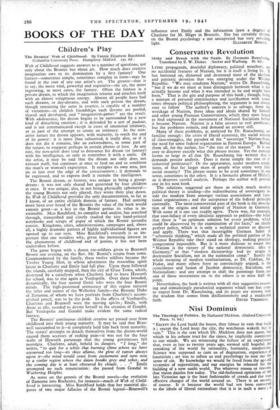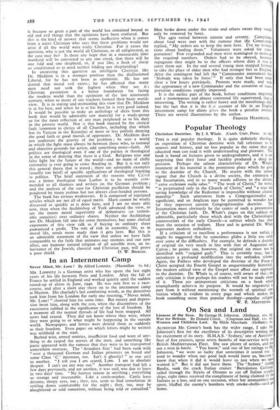Nisi Dominu's
The Theology of Politics. By Nathaniel Micklem. (Oxford University Press. 7s. 6d.)
" EXCEPT the Lord build the house, they labour in vain that build it ; except the Lord keep the city, the watchman waketh but in vain." This is the text which Dr. Micklem does not quote, but which in his urbane tract for the times, he implicitly commends to our minds. We are witnessing the failure of an experiment that, even as late as twenty years ago, seemed still hopeful, the remaking of the world by rationality, humanity, moderation. Science was supposed to cure- us of dogmatism, experience of fanaticism ; art was to soften us and psychology to root out the sense of sin. By knowledge we would be freed from the age-old tyrannies of superstition, and our energies be released for the building of a new sunlit world. For whatever reason or reasons, that vision dazzles few today. The old-fashioned optimism of the late Victorian age is the least fashionable of creeds and the least effective changer of the world around us. There is an answer, of course. It is because the world had not been converted to the ideals of liberal rationalism that it is in such a mess ;
is because so great a part of the world has remained bound to old and evil things that the optimists have been confuted. But this is the kind of answer that seems ineffective when it comes from a naive Christian who says that these problems would not arise if all the world were really Christian. For it raises the question, why is not the world all Christian, or all enlightened, as the case may be? Is there any hope that in a measurable time mankind will be converted to any one creed, that there will be one fold and one shepherd, or, if you like, a flock of sheep so conditioned as to need neither folding nor shepherding?
In answering this question an intelligent Christian like Dr. Micklem is in a stronger position than the disillusioned Liberal, for he has not been as optimistic. He has not denied that moral evil exists • he has affirmed that many men need not seek the highest when they see it ; Christian pessimism is a better foundation for facing the modem world than the optimism of the late nineteenth century, when so many of our teachers formed their basic world- view. It is in stating and Insinuating this view that Dr. Micklem is at his best, and when he is at his best he is very good indeed. It would be possible to make an anthology of dicta from this book that would be admirable raw material for a study-group or for the inner reflection of any man perplexed as to his duty in the present world. Nor is this book marred by the clerical fault (common to clerics of all Churches, including that which has its Vatican in the Kremlin) of more or less politely denying the good faith or good morals of opponents. Dr. Micklem does not underrate the gravity of the problem ; he sees a world in which the fight must always be between those who, to rational and objective grounds for action, add something more—faith. All politics are theological even if one of the parties is theological in the sense of denying that there is a God. Religions true and false fight for the future of the world—and no main of chilly rationality is ever going to come flooding in. But it is not only this general thesis that is stated ; there are admirable examples (usually too brief) of specific applications of theological learning to politics. The brief statement of the reasons why Calvin was a better theologian than Luther is to be warmly com- mended to all thinkers and writers on the German problem - and the analysis of the case for Christian pacificism should be pondered by many zealous 'but not always clear-headed persons.
The book has serious weaknesses. It is composed of reprinted articles which are not all of equal merit. Marx cannot be wisely discussed as quickly as is done here, and I am no more able now, than when the Archbishop of York advanced the view, to see the innate moral superiority of debentures (or termin- able annuities) over ordinary shares. Neither the Archbishop nor Dr. Micklem fall into the error themselves, but some clerical exponents of this view talk as if buying an ordinary share guaranteed a profit. The role of risk in economic life, as in moral life, needs more study than it gets here. But this is an admirable statement of the view that unless we have faith comparable to the faith that animates our enemies and our new allies, our humane natural religion of all sensible men, an in- heritance of the Jewish, classical and Christian past, will prove



























 Previous page
Previous page